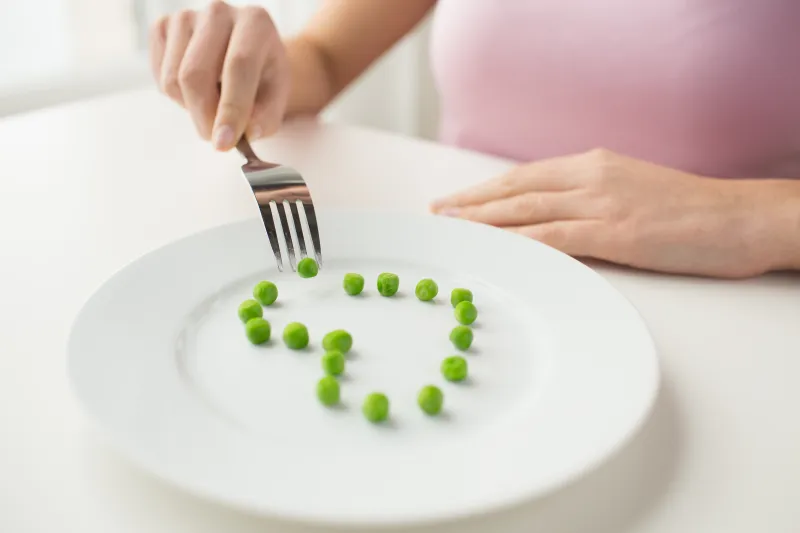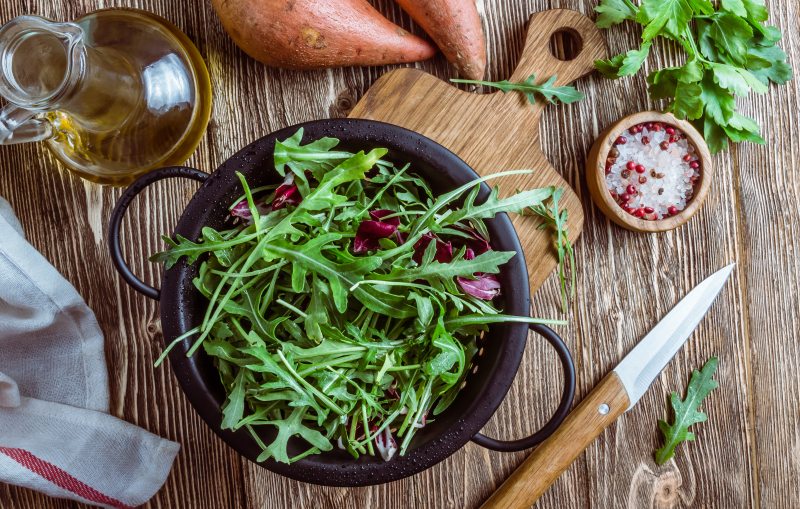At a glance
While peas are often viewed as a healthy side dish, their carb content varies widely between types, and some are far more keto-friendly than others.
Peas are a popular vegetable with a starchy flavor that can be used in sweet and savory recipes. But are peas keto-approved?
The answer depends on the exact pea variety and their carbohydrate content. Green peas, for example, aren’t keto-approved, while sugar snap peas can be enjoyed in moderation.
Let’s examine the different types of peas and their nutrition facts to determine whether they’re suitable for a Healthy Keto® diet.
How many carbs are in peas?
Green peas are the most common type of peas found in most grocery stores. They’re usually sold fresh, canned, or frozen and can be added to soups, salads, stir-fries, and even desserts.
However, they’re high in carbs, which can impact blood sugar and insulin levels, making them unsuitable for a ketogenic diet.
According to the U.S. Department of Agriculture (USDA), 100 grams of raw green peas contain 14.4 grams of total carbs, which can quickly push you out of ketosis.1
Let’s look at the nutritional value of other pea varieties, measured per 100 grams:
Sugar snap peas:
- 41 calories
- 2.3 g protein
- 0 g fat
- 7 g total carbs
- 2.4 g fiber
- 4.6 net carbs
Snow peas:
- 42 calories
- 2.8 g protein
- 0.2 g fat
- 7.5 g total carbs
- 2.6 g fiber
- 4.9 g net carbs
Split peas:
- 118 calories
- 8.4 g protein
- 0.4 g fat
- 21.1 g total carbs
- 8.3 g fiber
- 12.8 g net carbs

Are peas keto-friendly?
Depending on the exact variety, peas can be keto-approved when consumed in moderation.
For instance, sugar snap peas and snow peas contain fewer than five grams of net carbs per 100 grams, making them suitable for a low-carb meal plan.
On the other hand, green and split peas should be avoided by those following a ketogenic diet due to their high content of digestible carbs.
Digestible carbs can spike blood glucose levels and kick the body out of ketosis, interfering with fat burning and hindering weight loss.
Additionally, some people may confuse black-eyed peas and chickpeas with traditional peas. However, these options are carb-heavy legumes and should be avoided by those following a low-carb diet.
Watch the video below to discover the best keto fruits and vegetables.
6 low-carb vegetables to have on keto
Are you feeling overwhelmed trying to figure out which vegetables are suitable for a keto diet? You’re not alone!
With so many options available, it can be challenging to determine which vegetables fit within the carb counts of a ketogenic lifestyle.
Here are six nutritious options that won’t kick you out of ketosis.
1. Beet greens
Beet greens are the leafy tops of beetroots. They’re incredibly low-carb, rich in vitamin C, and an exceptional source of nitrates.
“Nitrates are converted into nitric oxide in the body, which help to keep blood vessels wide and open, thereby improving blood flow and supporting healthy blood pressure,” explains Dr. Berg.
2. Zucchini
Zucchini is often used in low-carb dishes to substitute ingredients with too many carbs, such as pasta or potato fries.
This fresh and crispy fruit is rich in potassium, which can help replenish electrolytes essential for maintaining proper muscle function, hydration, and overall cellular health.
3. Spinach
Whether consumed raw in salads or cooked into a creamy dish, spinach is a versatile low-carb vegetable with plenty of health benefits.
Research published in Food & Function found spinach contains various phytochemicals and bioactive compounds that help protect against oxidative damage, regulate metabolic pathways, help reduce inflammation, and support weight loss.2
These benefits contribute to spinach’s anti-cancer, anti-obesity, blood sugar-lowering, and cholesterol-reducing properties.

4. Arugula
Arugula is a cruciferous vegetable with a tangy, peppery taste, making it the perfect addition to salads and pesto.
Regularly including this green superfood in your keto meal plan can provide a significant boost of nutrients.
A study published in Advanced Phytochemicals and Plant-Based Drug Discovery found arugula to be a rich source of vitamin C, flavonoids, phenolic compounds, glucosinolates, and carotenoids.
The research further revealed that the compounds in arugula are responsible for various health benefits, including the potential to reduce cancer risk, protect against ulcer formation, and support healthy liver function.
5. Bok choy
If you love Asian cuisine, you’re probably familiar with bok choy.
This low-carb vegetable is a rich source of beta-carotene, which is converted into vitamin A, a crucial nutrient needed for healthy vision and robust immune function.
Bok choy also contains sulforaphane, a potent antioxidant that has plenty of health benefits.
A study published in Antioxidants suggests that sulforaphane may possess anti-tumor, antidiabetic, and cardioprotective effects.3
6. Romaine lettuce
Most types of lettuce, including romaine, are keto-approved and can be added to salads or used as a shell for low-carb wraps and tacos.
Romaine lettuce offers plenty of folate, which is essential for cellular function and DNA synthesis.
This popular salad vegetable also provides significant amounts of vitamin K, helping to maintain bone health and regulate blood clotting.
Key takeaways
- Peas provide protein and fiber but are relatively high in carbohydrates, which can raise blood sugar and interfere with ketosis.
- Sugar snap and snow peas can fit a Healthy Keto® plan in moderation, while green and split peas contain too many carbs and should be limited or avoided.
- Other low-carb vegetables suitable for a Healthy Keto lifestyle include beet greens, zucchini, spinach, arugula, and bok choy.
FAQ
1. Are peas keto?
It depends on the exact type of pea and their carb content. Sugar snap and snow peas contain the lowest net carbs and can be enjoyed in moderate amounts, while green and split peas should be avoided due to their high carbohydrate content.
2. Are peas high in carbs?
The most common peas, green and split peas, contain between 9 to 13 grams of net carbs per 100 grams, making them unsuitable for a keto diet.
However, sugar snaps and snow peas have around five grams of net carbs per 100 grams and can be enjoyed on a low-carb diet.
3. What vegetables are not keto-friendly?
Starchy vegetables, such as beans, corn, and sweet potatoes, aren’t keto-approved.
Additionally, processed vegetable products, including those with added sauces or seasonings, may contain hidden carbs, and it’s best to choose fresh vegetables whenever possible.
4. What vegetables can I eat on keto?
Plenty of vegetables are low in carbs, including leafy greens such as spinach and arugula, as well as cruciferous vegetables such as broccoli, Brussels sprouts, and cauliflower.
Non-starchy options such as cauliflower, zucchini, green beans, and green bell peppers are also keto-approved.
5. Are peas healthy?
Peas are a healthy food choice due to their high fiber and protein content. However, some varieties may contain a significant amount of carbs. Therefore, it’s essential to choose low-carb options such as snap peas and snow peas.
6. Are some peas better than others?
Yes, some peas, such as sugar snap and snow peas, have a lower carb count than green or split peas and can be enjoyed in moderation by those who limit their carb intake.
Sources
- https://fdc.nal.usda.gov/food-details/170419/nutrients ?
- https://pubs.rsc.org/en/content/articlelanding/2016/fo/c6fo00051g/unauth ?
- https://www.ncbi.nlm.nih.gov/pmc/articles/PMC10886109/ ?


















